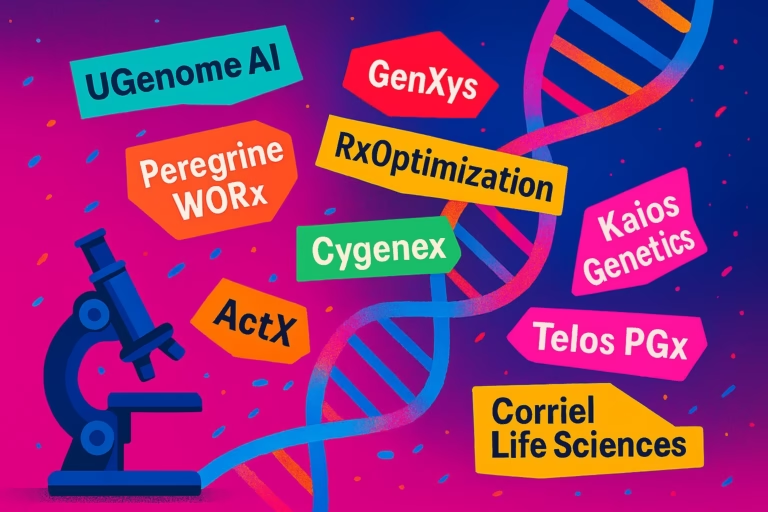In March 2025, U.S. Representatives Dan Crenshaw (R-TX) and Eric Swalwell (D-CA) introduced a bipartisan bill that could reshape how medication is prescribed across the country. Known as the Right Drug Dose Now Act, the legislation aims to formally integrate pharmacogenomic (PGx) testing into routine healthcare by updating the National Action Plan for Adverse Drug Event Prevention. If passed, the bill would make gene-informed prescribing a clinical standard rather than a cutting-edge exception.
Pharmacogenomics has long held the promise of improving patient outcomes by helping clinicians tailor medications to an individual’s genetic profile. That promise is now being backed by policy. Under the Act, healthcare systems would be required to embed PGx data into electronic health records (EHRs) and equip their clinical decision support (CDS) tools with real-time alerts for gene-drug and gene–drug–gene interactions. It also mandates guidance from the Department of Health and Human Services (HHS) on how providers should handle referrals to genetic specialists and how adverse drug events related to genetic incompatibility should be reported to the FDA.
This legislative push is both timely and necessary. Adverse drug events remain one of the top causes of hospitalization and mortality in the U.S., costing the healthcare system more than $500 billion annually. Genetic variability is a major, often overlooked, contributor. A recent analysis found that variants in just three genes—CYP2C19, CYP2D6, and SLCO1B1—could explain nearly 9% of adverse drug reactions, and that preemptive testing could help avoid up to 75% of those events. PGx-informed prescribing is evidently smarter and more cost-effective.
Hospitals and health systems will need to prepare for this shift by upgrading their infrastructure. EHR platforms must be able to store and surface validated PGx test results, ideally linked to curated guidance from CPIC, the FDA, or institution-specific protocols. Clinical teams will also require education on interpreting genetic reports and acting on CDS recommendations. Genetic counselors or pharmacists trained in PGx may be needed to support frontline providers, especially when dealing with complex drug regimens or multi-gene interactions.
The Act builds on real-world momentum. In Michigan, Blue Care Network has already launched a PGx-informed prescribing program covering oncology, cardiology, and behavioral health—with no added cost to patients. Institutions like Mayo Clinic, Mount Sinai, and UCLA Health have incorporated gene-drug interaction alerts into their EHR systems. Clinical trials continue to validate the utility of PGx: one 2024 meta-analysis showed that PGx-guided antidepressant therapy increased remission rates by 41% while reducing side effects.
Support for the bill is strong. Organizations such as the Get the Medications Right Institute (GTMRx) and the Personalized Medicine Coalition have endorsed it. Industry stakeholders, including genomic labs, EHR vendors, and pharmacy benefit managers, are already positioning to align with its provisions. There is also global resonance: from the NHS in Scotland using CYP2C19 genotyping for stroke care, to India’s Genome India initiative creating a national PGx database, precision prescribing is gaining traction worldwide.
For U.S. healthcare leaders, the message is clear: PGx is no longer a future aspiration but a clinical, economic, and regulatory imperative. The Right Drug Dose Now Act formalizes what many in the medical community have known for years; that genetic insight should guide therapeutic decisions, especially when the stakes involve safety, efficacy, and patient trust.
As the bill advances, the next steps for healthcare organizations are practical ones: assess your current PGx capabilities, identify gaps in EHR/CDS integration, train prescribing teams, and evaluate partnerships with testing providers. Genetic variability is a clinical variable. The systems we build now will determine whether it becomes an obstacle or an opportunity for better care.
The Right Drug Dose Now Act underscores the critical role of genetic information in informing treatment decisions. As global initiatives embrace pharmacogenomics, U.S. healthcare leaders must prioritize the integration of precision prescribing practices. Healthcare organizations are urged to evaluate their PGx capabilities, enhance EHR/CDS integration, train staff, and collaborate with testing providers to ensure genetic insights optimize patient care.
For more great articles, go here.
#Therightdrugdose #Pharmacogenomics #PGX #APGxA





